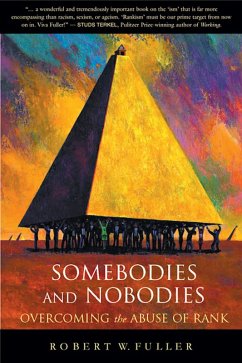What corporate corruption, sexual abuse by clergy, and schoolyard bullying all have in common
In the on-going attempts to overcome racism and sexism in North America today, we are overlooking another kind of discrimination that is no less damaging and equally unjustifiable. It is a form of injustice that everyone knows, but no one sees: discrimination based on rank. Low rank-signifying weakness, vulnerability, and the absence of power-marks you for abuse in much the same way that race, religion, gender, and sexual orientation have long done.
When discrimination is race-based, we call it racism; when it's gender-based, we call it sexism. By analogy, rank-based discrimination might be called "rankism." Somebodies and Nobodies explains our reluctance to confront rankism, and argues that abuse based on power differences is no more justified than abuse based on color or gender differences. It shows where analyses based on identity fall short and, using dozens of examples to illustrate the argument, traces many forms of injustice and unfairness to rankism.
Somebodies and Nobodies unmasks rankism as The Feminine Mystique unmasked sexism. It demythologizes the prevailing social consensus-the "Somebody Mystique"-to demonstrate the pervasiveness and corrosiveness of rankism in our personal lives and social institutions. The book introduces new language and concepts that illuminate the subtle, often dysfunctional workings of power in our social interactions. It presents rankism as the last hurdle on the long road from aristocracy to a true meritocracy, brings into focus a dignitarian revolution that is already taking shape, and offers a preview of post-rankist society.
In the on-going attempts to overcome racism and sexism in North America today, we are overlooking another kind of discrimination that is no less damaging and equally unjustifiable. It is a form of injustice that everyone knows, but no one sees: discrimination based on rank. Low rank-signifying weakness, vulnerability, and the absence of power-marks you for abuse in much the same way that race, religion, gender, and sexual orientation have long done.
When discrimination is race-based, we call it racism; when it's gender-based, we call it sexism. By analogy, rank-based discrimination might be called "rankism." Somebodies and Nobodies explains our reluctance to confront rankism, and argues that abuse based on power differences is no more justified than abuse based on color or gender differences. It shows where analyses based on identity fall short and, using dozens of examples to illustrate the argument, traces many forms of injustice and unfairness to rankism.
Somebodies and Nobodies unmasks rankism as The Feminine Mystique unmasked sexism. It demythologizes the prevailing social consensus-the "Somebody Mystique"-to demonstrate the pervasiveness and corrosiveness of rankism in our personal lives and social institutions. The book introduces new language and concepts that illuminate the subtle, often dysfunctional workings of power in our social interactions. It presents rankism as the last hurdle on the long road from aristocracy to a true meritocracy, brings into focus a dignitarian revolution that is already taking shape, and offers a preview of post-rankist society.
Dieser Download kann aus rechtlichen Gründen nur mit Rechnungsadresse in A, D ausgeliefert werden.









